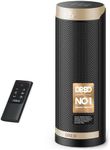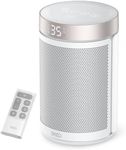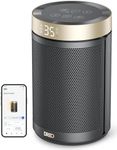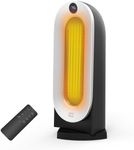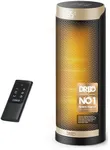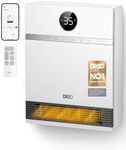Buying Guide for the Best Space Heaters
Choosing the right space heater can make a big difference in your comfort during the colder months. Space heaters come in various types and sizes, each designed to meet different needs. To find the best fit for you, it's important to understand the key specifications and how they align with your specific requirements. Here are the main factors to consider when selecting a space heater.Type of HeaterSpace heaters come in several types, including ceramic, oil-filled, infrared, and fan-forced. Ceramic heaters are quick to heat up and are good for small to medium-sized rooms. Oil-filled heaters are slower to heat but provide consistent warmth and are ideal for larger spaces. Infrared heaters warm objects and people directly, making them efficient for spot heating. Fan-forced heaters distribute heat quickly but can be noisier. Choose the type based on the size of the room and your preference for heating speed and noise level.
Heating CapacityHeating capacity is measured in watts or BTUs (British Thermal Units) and indicates how much heat the heater can produce. Generally, a heater needs about 10 watts to heat each square foot of space. For example, a 1500-watt heater can effectively heat a room of up to 150 square feet. Consider the size of the room you need to heat and choose a heater with the appropriate capacity to ensure efficient and effective heating.
Energy EfficiencyEnergy efficiency refers to how well a heater converts electricity into heat. Look for heaters with energy-saving features such as adjustable thermostats, programmable timers, and eco-modes. These features help reduce energy consumption and lower your electricity bills. If you plan to use the heater frequently, investing in an energy-efficient model can save you money in the long run.
Safety FeaturesSafety is crucial when using space heaters. Look for models with features like overheat protection, tip-over switches, and cool-touch exteriors. Overheat protection automatically shuts off the heater if it gets too hot, while tip-over switches turn off the heater if it is knocked over. Cool-touch exteriors prevent burns if you accidentally touch the heater. These features are especially important if you have children or pets.
Noise LevelThe noise level of a space heater can affect your comfort, especially if you plan to use it in a bedroom or office. Fan-forced heaters tend to be noisier due to the fan operation, while oil-filled and infrared heaters are generally quieter. Consider where you will be using the heater and choose a model with a noise level that won't disturb your activities or sleep.
PortabilityPortability refers to how easy it is to move the heater from one room to another. If you need to heat different areas of your home, look for a lightweight model with handles or wheels. This makes it convenient to transport the heater as needed. If the heater will stay in one place, portability may be less of a concern.
Control OptionsControl options include manual controls, remote controls, and smart features. Manual controls are straightforward and easy to use, while remote controls allow you to adjust settings from a distance. Some modern heaters come with smart features that enable you to control the heater via a smartphone app or voice commands. Choose the control options that best fit your lifestyle and preferences.






